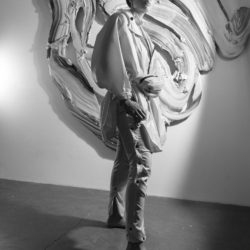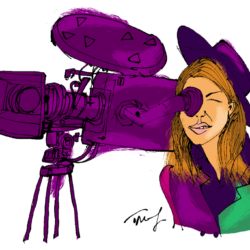Portraits, conjuring up a french fantasy of stockings, red lipstick, trench coats and gauloise cigarettes. Laura Sfez is candid and self-assured, but that wasn’t always the case.
PHOTOS BY ISABELLA SFEZ INTERVIEW BY ROSE GARDNER

Growing up between Paris and LA and navigating two cultures, fighting to make it in the fashion business and suffering through an abusive relationship, she almost lost her way. It was in her anger that she found the strength to rebuild, and in revising female stereotypes – schoolgirl, maid, secretary – into smart, sexually empowered, courageous role models in her work, she found herself again.
VM: Tell us about your background.
LS:I was born in Paris and we moved to LA when I was four. My father wanted the American dream. He and my mother grew up very poor: it was just after World War II and we’re Jewish. They had more hope here, and we had our pool and the sunshine, but we didn’t have our family. So we’d move back and forth every two to four years. My father worked in fashion, and it was always up and down. He was constantly reinventing himself. He definitely taught me that it’s natural to have lows in the fashion business, because you’re not selling food. You have to create the need, and understand people.
VM: Is your creativity inspired from a combination of Paris and LA?
LS: Absolutely. Paris is a huge playground for my photography – the clothes
belong there. And I get a lot spiritually out of Paris from the people. LA is
less inspiring photo-wise and can be lonely, but growing up on American movies
and rock ‘n’ roll has definitely influenced me. Also the sense of health and
fitness – working out is an important part of my creative process. Paris would
never give me that. There you just smoke cigarettes and don’t eat.
VM: What does L’ecole Des Femmes mean?
LS:It’s from a play by Moliere and means “school for wives.” I wanted to distort the name into a different story, school of women, like an army. Some of the roles might be considered weak, but I like to put them in a new context where they’re not. I want to admire the beauty of the schoolgirl or the French maid and subvert the stereotypes. The characters are alter-egos – all parts of me, different moods. I’ve always been into impersonations, movies and music.
VM: How did you come to model for the brand?
LS: At first I was too shy. I had an abusive husband at the time, and when I first posted pictures, he said, “You look ridiculous, you’re not a model, stop it.” The first post on my Instagram is of my glasses, after I cried in them, because I agreed. I thought, “Yeah, it’s ridiculous; I’m ridiculous’. But then I fought back. I was very angry.
VM: What was the turning point?
LS:During the five years I was with him, I completely forgot who I was. I wasn’t allowed to be myself, to wear red lipstick or listen to music, or watch movies — anything that I liked. I buried all of it. One day I listened to some music on my own – Nirvana’s “Oh Me” – and I never wanted to stop listening to it ever again. It reminded me of who I was and all the things that I loved. The music told me to fight back.
VM: How did that relationship affect you and your work?
LS:It made me extremely strong. Most artists would say anger is negative, but for me it’s always been the greatest tool. It’s the strongest emotion. It moves you. I’m more motivated when I’m angry. If somebody discourages me, it just makes me want to prove them wrong.
VM: Who are your heroes?
LS:My biggest hero is Iggy Pop, because he never fit in. He’s a very elegant savage. I relate to his energy, the way he does things on instinct, and how much he fucked up in his life in order to find himself. He only became really successful in his sixties, and he really suffered. I always like artists who suffer; I relate to that very much.
VM: What are you most proud of?
LS: Not being afraid of being alone. I’ve found myself, and I’m still doing it. All the things I’ve lost, I’m finding again through my art.


